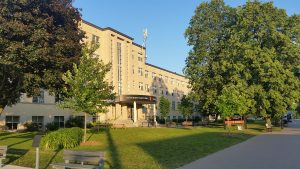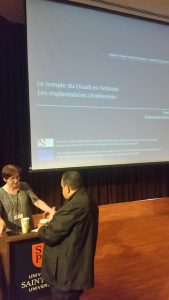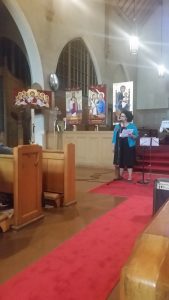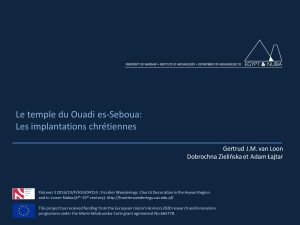The Association francophone de coptologie (AFC) was founded in 1982 as a membership organisation for French-speaking scholars working in all fields of Coptic Studies and those who have an interest in Christian Egypt. Every two years, the AFC organises a Journée d’études, open to all members and interested scholars/public.
Originally a one-day conference, this meeting has grown into a three-day congress. Through the years, it has been organized by universities and museums all over France, French speaking Switzerland and Belgium, and, on the invitation of long-time members, in Rome and Lisbon. The proceedings are published in the series Cahiers de la bibliothèque copte.
I have participated in most of these Journées d’études since the 1991 Journée in Périgueux, after which I became a member. Since 2015, I have been a member of the board.
On the invitation of Jitse Dijkstra (Department of Classics and Religious Studies/ Département d’études anciennes et de sciences des religions, University of Ottawa/Université d’Ottawa), the 2019 Journée d’études took place in Ottawa in a joint meeting with the Canadian Society for Coptic Studies. The conference venues were at the University of Ottawa/Université d’Ottawa, the Université Saint Paul/Saint Paul University, and Carleton University. The programme can be found here.

Université – Saint Paul – University
After an animated and interesting opening lecture by Mariz Tadros (University of Sussex) at Carleton University’s Dominion-Chalmers Centre, the first two days of the Journée were organized at Saint Paul University, while the last day took us back to the centre of town, to the University of Ottawa. We ended with a visit to the Coptic Orthodox Church of St. Mark and St. Mary of Egypt.
At Saint Paul’s, the sessions were devoted to archaeology and architecture, literature, museum collections, magic, epigraphy, art history, papyrology and the modern history of the Copts.
 My contribution (in collaboration with Dobrochna and Adam), Le temple du Ouadi es-Seboua: Les implantations chrétiennes, revisited the church in the temple of Wadi es Sebua, presented at the Poles on the Nile Archaeological Conference earlier this month. Apart from the story of the discovery of the wall paintings and a presentation of the iconographical programme, this talk focussed on architectural features of the Christian installations in the temple (one or two churches/chapels, the double entrance) and on the question of “Egyptian” and “Nubian” characteristics in the wall paintings and iconographical programme.
My contribution (in collaboration with Dobrochna and Adam), Le temple du Ouadi es-Seboua: Les implantations chrétiennes, revisited the church in the temple of Wadi es Sebua, presented at the Poles on the Nile Archaeological Conference earlier this month. Apart from the story of the discovery of the wall paintings and a presentation of the iconographical programme, this talk focussed on architectural features of the Christian installations in the temple (one or two churches/chapels, the double entrance) and on the question of “Egyptian” and “Nubian” characteristics in the wall paintings and iconographical programme.
Adam and our friend and colleague Grzegorz Ochała had conducted a preliminary investigation on the inscriptions visible in the photographs and they were able to decipher a Coptic inscription with the formula “God of the Theotokos”. According to the well-known formula “God of NN.”, this church would have been dedicated to the Virgin Mary, the God-bearer.
On Saturday, the session at the University of Ottawa was centred around Coptic music, past and present. It was followed by the closing lecture by Jacques van der Vliet on texts on dowry and engagement rites in the archive of Bishop Pesynthios of Qift (569–632 AD) and the meeting of the board and members of the AFC.

Carolyn Ramzy in the Church of St. Mark and St. Mary of Egypt
Music was also the theme of our visit to the Church of St. Mark and St. Mary of Egypt. After a wonderful lunch prepared by the Coptic community we were given a tour in the church by Fr. Joseph Dawoud and his wife Claudine. Carolyn Ramzy (ethnomusicologist at Carlton University) introduced the Coptic Music Performance, featuring a Psalm (Arabic, Coptic and English) in various tones, a liturgical hymn (Coptic, Arabic and English) and religious songs translated from Arabic with new compositions and arrangements, all performed by members of the church choir. The discussion at the end centred on questions of tradition, development, identity and belonging. Music, stemming from a centuries old tradition, adapts to changing times, regions and to changing tastes, thereby preserving the faith and spirit of ancestors. How can this music help in preserving the community, and to allow people to feel at home in the diaspora?
It was an impressive end. Thank you so much Jitse and everyone who has assisted you in organizing these days, for your hospitality!


Ottawa – View on Parliament Hill
